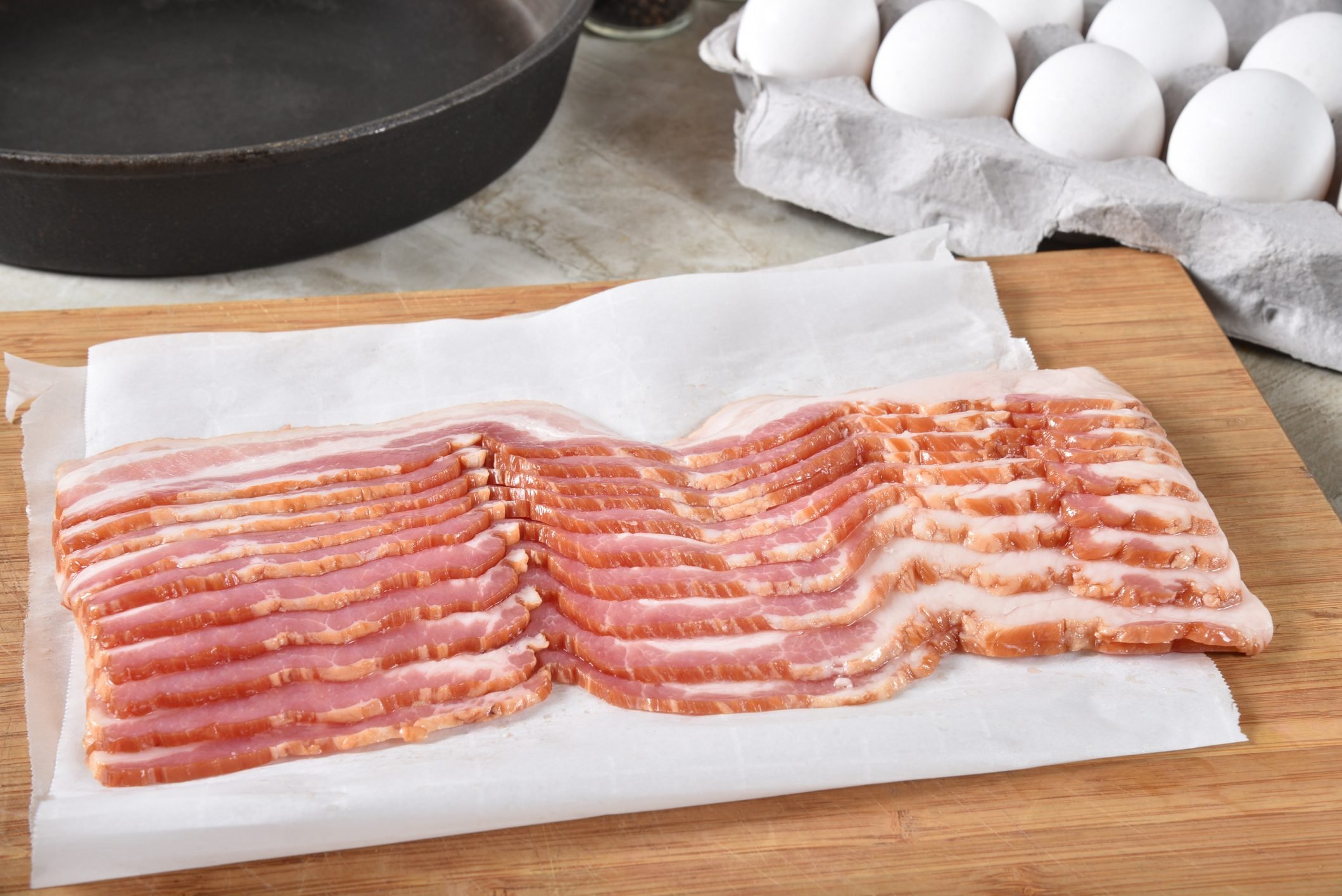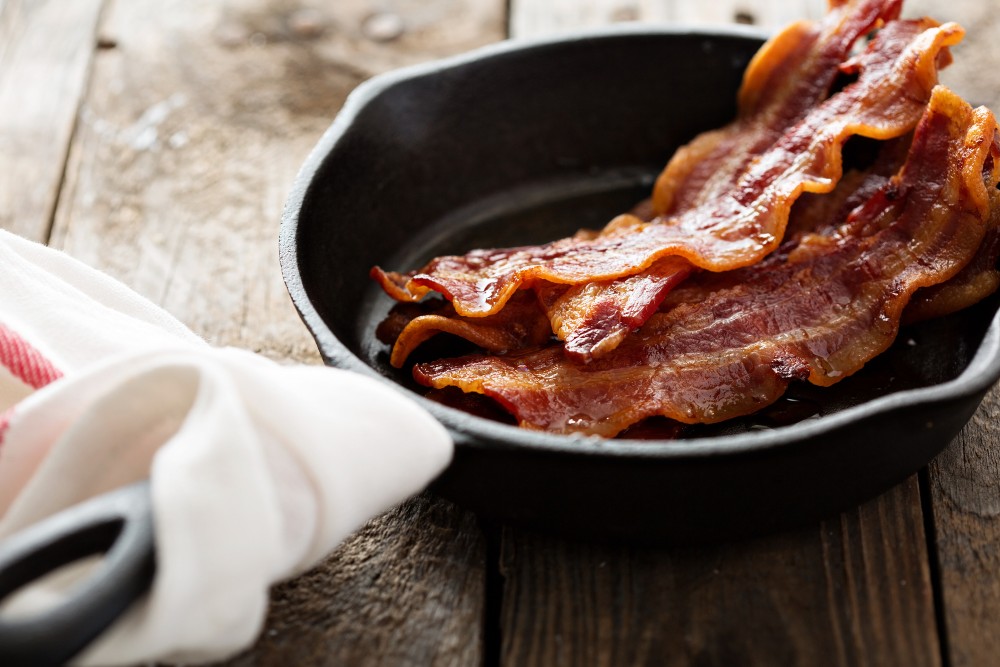The short answer is yes, cats can eat bacon in small amounts, but you shouldn’t give your cat bacon all the time.
Everyone agrees that bacon is one of the best things about Sunday brunch. It’s tasty, salty, and crunchy. Cats, like dogs, have to eat meat, and they might be tempted to try a bite of your crispy breakfast side. You can give your cat a small amount of bacon without worrying about them getting sick, but we don’t suggest doing it all the time.
Bacon is a delicious and popular breakfast food for us humans. That irresistible smell of sizzling bacon is enough to get most people out of bed in the morning! But what if your curious cat manages to snag a piece of raw bacon? Is it safe for cats to eat? Here’s what you need to know about cats and raw bacon.
Can Cats Eat Raw Bacon?
Raw bacon itself is not toxic to cats. However, there are some potential risks with your cat eating raw bacon that you should be aware of.
The main concerns with raw bacon are
-
Fat content – Bacon contains a high amount of fat, which can cause pancreatitis in cats if too much is consumed. Pancreatitis is a serious inflammatory condition that requires veterinary treatment.
-
Raw meat – Raw pork may contain pathogens like salmonella and E. coli that can make your cat sick. Cooking the bacon kills these harmful bacteria.
-
Salt – Bacon contains a lot of sodium, which can cause salt poisoning in cats if too much bacon is eaten. This can lead to vomiting, diarrhea, seizures, and even death.
So while a small piece of bacon won’t immediately harm your cat, eating too much raw bacon can be dangerous. It’s best to avoid letting your cat get into raw bacon.
Symptoms of Bacon Toxicity in Cats
If your cat manages to eat a large amount of raw bacon, watch for these signs of sickness:
- Vomiting
- Diarrhea
- Lethargy
- Loss of appetite
- Excessive thirst or urination
- Abdominal pain
- Fever
- Seizures
Bacon toxicity can also lead to pancreatitis, which causes symptoms like vomiting, abdominal pain, weakness, and dehydration.
If you see any of these symptoms after your cat ate raw bacon, take them to the vet right away as it can be life-threatening. Call the ASPCA Poison Control Center at 888-426-4435 if you have any concerns.
What to Do If Your Cat Eats Raw Bacon
If your cat snags a small piece of bacon when you’re not looking take the following steps
-
Monitor for symptoms – Keep an eye on your cat for any signs of illness like vomiting or lethargy. Contact your vet if you notice anything abnormal.
-
Restrict access – Make sure any remaining raw bacon is out of your cat’s reach. Store bacon safely in the fridge or high cabinet.
-
Call your vet – Your vet may advise bringing your cat in if they ate a large amount of raw bacon. They can check for pancreatitis and other problems.
-
Induce vomiting – If your cat just ate the bacon, your vet may recommend inducing vomiting to get the pork out of their system. Only do this under your vet’s guidance.
-
Provide fresh water – Ensure your cat has plenty of fresh, clean drinking water available to help flush their system.
With quick action, your cat should recover just fine if they sneak some raw bacon. Just supervise them closely and get veterinary advice when needed.
Is Cooked Bacon Safe for Cats?
While raw bacon is risky, small amounts of cooked bacon are safer for cats to eat on occasion. Here are some tips on feeding your cat cooked bacon:
-
Unseasoned – Use plain bacon without added spices, sugar, or marinades which can upset your cat’s tummy.
-
Cooked crispy – Fully cooked, crispy bacon is safer than undercooked chewy bacon in terms of bacteria risk.
-
Lean pieces – Choose lean back bacon rather than fatty belly bacon, and trim off visible fat.
-
Small portions – Feed only a few tiny shredded pieces at a time to avoid pancreatitis and salt poisoning.
-
Occasional treat – Bacon should only be an occasional treat, not a regular part of your cat’s diet.
It’s healthiest to stick to high-protein cat foods and treats. But as a rare snack, a bit of cooked plain bacon won’t harm your kitty. Monitor them for any digestive upset.
Can Kittens Eat Bacon?
It’s best to avoid feeding raw or cooked bacon to kittens under 1 year old. Kittens have sensitive digestive systems and weaker immune defenses than adult cats.
Bacon is very rich and fatty for a kitten’s stomach. The high sodium content can also cause electrolyte imbalances. Kittens are also at higher risk for foodborne illnesses from raw pork.
For optimal nutrition and health, feed your kitten only kitten-approved commercial food and treats. Wait until they are fully grown before offering the occasional bacon bit as a reward.
Long-Term Risks of Bacon for Cats
While the odd piece of cooked bacon won’t necessarily hurt your cat, regular bacon feeding comes with some risks:
-
Obesity – Bacon is high in fat and calories, which can quickly lead to weight gain and obesity in cats. An overweight cat is prone to diabetes, joint problems, and heart disease.
-
Pancreatitis – The high fat content of bacon makes repeated feedings more likely to cause pancreatitis, which can become chronic.
-
Nutritional imbalance – Bacon on its own is not nutritionally balanced for cats. Replacing their normal food with bacon can cause vitamin and mineral deficiencies over time.
-
Sodium overdose – Frequent bacon servings could potentially lead to excessive sodium intake and salt poisoning.
For best health, cats should eat a balanced commercial cat food diet with proteins like chicken, fish, beef or turkey. Bacon is too fatty and salty for everyday meals.
Healthy Treats for Cats
Instead of bacon treats, consider these healthier snack options for your cat:
-
Cooked chicken or beef – Unseasoned, lean bits of meat.
-
Smoked salmon – In moderation due to salt content.
-
Cooked egg whites – Scrambled plain without oil or salt.
-
Green beans – Low calorie fiber.
-
Carrots – Cooked soft for kittens.
-
Low-sodium tuna – In water rather than oil.
-
Unsweetened yogurt – Has probiotics for digestion.
-
Cheese – Low-fat plain varieties.
-
Catnip – Fun interactive herb, not actually eaten.
Rotate various people foods as occasional treats along with high-quality cat treats to keep your kitty happy and healthy. Just steer clear of feeding them raw bacon in the future!
While the occasional nibble of cooked bacon won’t seriously harm your cat, raw bacon can introduce foodborne bacteria and cause salt poisoning or pancreatitis. Make sure raw bacon is always safely out of your cat’s reach. Speak to your vet right away if they eat a large quantity of raw bacon and monitor them closely for any symptoms. With some care, your kitty can go on to lead a long and happy bacon-free life!

Get rates for your pet:See My Rates »

The short answer is yes, cats can eat bacon in small amounts, but you shouldn’t give your cat bacon all the time.
Everyone agrees that bacon is one of the best things about Sunday brunch. It’s tasty, salty, and crunchy. Cats, like dogs, have to eat meat, and they might be tempted to try a bite of your crispy breakfast side. You can give your cat a small amount of bacon without worrying about them getting sick, but we don’t suggest doing it all the time.
Can cats eat raw bacon meat?
FAQ
Can cats get worms from raw bacon?
Will bacon hurt a cat?
What can happen if a cat eats raw meat?
Can cats eat raw out of date bacon?
Is Bacon bad for cats?
High salt consumption can result in various health concerns in your cat, including high blood pressure, weight gain, dehydration, and heat-related difficulties. The salt that your cat needs for living is provided by cat food, thus there is no need to add-on your cat’s diet with sodium through bacon.
What happens if a cat eats a hunk of bacon?
If a cat eats a large amount of bacon, call your vet for an immediate exam. They’ll need to monitor vitals such as blood pressure, hydration, and signs of sodium ion poisoning. Symptoms of this condition often include:
Can cats eat bacon bits?
Cats can eat a few pieces of fresh, raw bacon. However, it’s important to ensure that the bacon is fresh and clean, as germs in non-fresh bacon can be harmful to cats. If you have concerns, consult a vet.
What happens if a cat eats greasy Bacon?
As mentioned above, if your cat eats an excessive amount of greasy bacon it is likely that your cat will get an upset stomach. After that, there is a chance that your feline companion will be having bad diarrhea and puking all over the place.
